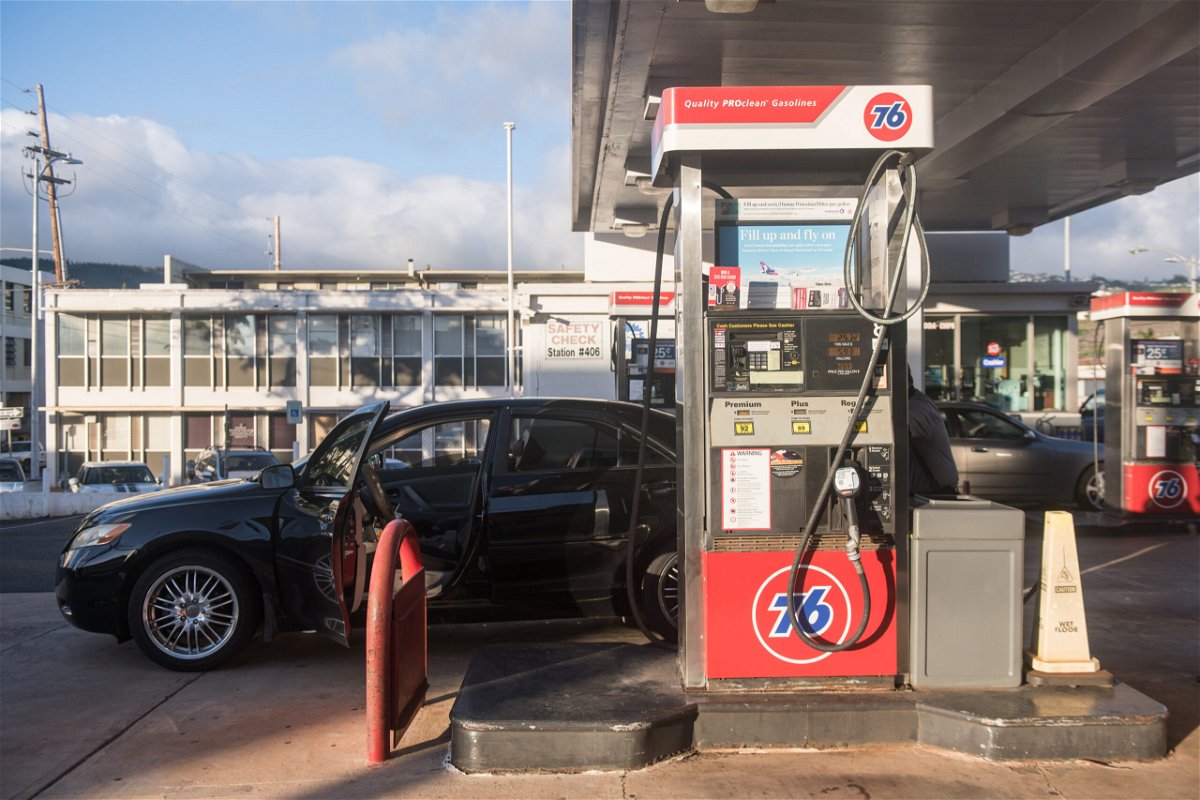Why Joe Biden can’t do much to ease gas prices

By Julia Horowitz, CNN Business
US President Joe Biden faces growing pressure to intervene in oil markets as Americans pay higher prices at the pump. But given the dynamics at play, is there really anything productive he can do?
What’s happening: Nearly a dozen Senate Democrats called on Biden on Monday to fight rising gas prices by considering a release of barrels from the nation’s emergency oil stockpile. In the letter, the lawmakers warned that the seven-year high in gas prices has “placed an undue burden on families and small businesses trying to make ends meet.”
The national average price of gasoline rose to $3.42 a gallon on Tuesday, up 62% from a year ago, according to the American Automobile Association.
US Energy Secretary Jennifer Granholm told CNN over the weekend that tapping the Strategic Petroleum Reserve, which contains around 613 million barrels of oil, is “one of the tools” Biden could leverage. Granholm suggested action could come as soon as Tuesday when a new government forecast on energy supply and demand is due out.
But experts are skeptical that accessing the SPR would make a real difference, and predict a fleeting impact on prices should Biden go that route.
That’s because the reason US oil prices have climbed by nearly 70% this year to above $82 per barrel has to do more with persistent trends than short-term factors.
“It’s the wrong tool to address the current elevated prices,” UBS analyst Giovanni Staunovo told me. “The strategic oil reserves usually help during a temporary disruption.”
The run-up in prices has been triggered by a surge in demand for fuel as the global economy recovers from its pandemic slump, as well as limited investment in boosting production outside of the Middle East. Those shifts may not be transitory.
In the past, when energy prices rose dramatically, that was incentive enough to push American firms to start spending more to boost output. This time around, however, that funding is harder to come by. Investors are less likely to back long-term projects as they weigh the consequences of the climate crisis. They’re also pushing companies to keep costs low and focus on returning money to shareholders after the twin price shocks in 2015 and 2020.
OPEC and its allies, including Russia, have indicated they won’t come to the rescue. They’re sticking to plans to gradually increase production, despite lobbying from the United States to move faster.
That creates an environment where crude prices will stay high no matter what Biden does this week. The US Energy Information Administration has predicted that US retail prices for regular-grade gas will remain above $3 per gallon for the rest of the year.
“It’s probably the new normal that prices will stay higher,” Staunovo said.
Big picture: In a recent note to clients, JPMorgan said that if the Biden administration moves ahead with a release of 30 million barrels over a 20-day period, it would shave $2 off year-end estimates for oil prices. If stocks are released over a week, the reduction could be as much as $5 per barrel.
But the bank’s strategists also highlighted the limitations of such a move.
“While tapping strategic reserves might provide short-term relief at the pump, so far we see little sign of consumers reacting to higher prices by cutting back demand,” they wrote.
Robinhood data breach sends shares tumbling
The latest headwind to hit Robinhood shares? A big hack.
This just in: The trading app said Monday that it was hit by a data breach earlier this month that exposed information on millions of customers and that hackers later demanded an extortion payment.
Shares are down 3.5% in premarket trading. Robinhood’s stock has been trading below its initial public offering price of $38 since late last month, when it reported disappointing financial results.
The trading platform said in a statement that the Nov. 3 attack allowed the unauthorized party to obtain a list of email addresses for about 5 million people and full names for another group of about 2 million people.
The incident led to the exposure of the names, birth dates and zip codes of approximately 310 people. About 10 customers had “more extensive account details revealed,” Robinhood said, without elaborating.
“We believe that no Social Security numbers, bank account numbers or debit card numbers were exposed and that there has been no financial loss to any customers as a result of the incident,” the company said in the statement.
The company said it “promptly” informed law enforcement but did not indicate whether it ultimately approved a payout to the hackers.
The unauthorized party gained access to Robinhood’s customer support systems by posing as an employee by phone.
Step back: The episode is a reminder of how companies are increasingly vulnerable to incidents of cyber crime, once considered black swan events.
Ransomware — in which a bad actor breaches a victim’s computer system, uses malware to encrypt the data and only decrypts it if the victim meets demands for payment — has been a particular problem.
Watch this space: On Monday, US law enforcement officials seized an estimated $6 million in ransom payments and charged a suspect from Ukraine over a damaging July ransomware attack on an American company — one of the most impactful actions yet in the Biden administration’s attempted ransomware crackdown.
The real reason Elon Musk might sell some Tesla shares
Should Elon Musk sell a large chunk of his Tesla shares, it may have more to do with taxes than Twitter.
Back up: Musk published a Twitter poll over the weekend asking followers whether he should sell 10% of his shares, noting that “much is made lately of unrealized gains being a means of tax avoidance.” Some 58% of respondents said yes.
The tweet got attention, like many of Musk’s social media antics. But the move isn’t really about a populist vote, according to my CNN Business colleague Chris Isidore.
He reports that Musk is just months out from a deadline to exercise a tranche of stock options he received years ago. If he doesn’t use them, he loses them. And if he does take his shares, he’ll face a monster tax bill that could range from nearly $11 billion to as much as $16 billion. That will require cash on hand.
Continued gains in the value of Tesla stock could push Musk’s tax bill even higher. Shares of the electric vehicle maker, which rose 743% last year, are up another 65% in 2021 — though they did drop 5% Monday following the poll.
“With a tax bill that we calculate at north of $10 billion, selling stock over the coming months is not a surprise, although holding a Twitter poll to sell 10% of his stock is another bizarre soap opera that can only happen to one company and one CEO in the world,” WedBush analyst Daniel Ives said in a note to clients.
Up next
BioNTech and Palantir report results before US markets open. Coinbase, DoorDash, Hostess Brands and Wynn Resorts follow after the close.
Also today: The US Producer Price Index arrives at 8:30 a.m. ET.
Coming tomorrow: Earnings from Disney, 23andMe, Affirm, FIGS, Beyond Meat and SoFi.
The-CNN-Wire
™ & © 2021 Cable News Network, Inc., a WarnerMedia Company. All rights reserved.




